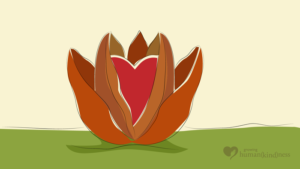Because overeating can feel so painful and frustrating, it’s easy to feel victimized by it. When we feel victimized by something, we tend to feel powerless, ashamed, and often deeply frightened.
You may experience this as a sense of terror or panic when you feel the urge to overeat arising, as well as a concomitant desire to control or “cut out” this painful thing.
Ouch, it can really hurt!
I’m going to share how a shift in perspective can tame the shame, fear, and frustration of overeating into something workable, hopeful, and life affirming.
What if you approached overeating (and your relationship with food) as an emotional practice?
Here’s why I invite you to consider this possibility: with this shift, we move out of powerlessness (a state of fight, flight, collapse or freeze) and into a place of relationship – where we have courage, power, and the capacity to move, act, and care.
Changing your relationship to your struggle
A story can help here.
As I went about my day yesterday – taking one kiddo to high school diving try outs and helping him walk through all his mixed feelings about it, helping another child process his fear and anger about an incident that happened with a teacher, and meeting with a listening partner to have a good cry about some of my own frustrations – I was approaching these events from the perspective that “parenting is an emotional practice” – that parenting is an opportunity to learn how to feel and embrace a wide range of emotions and experiences, and where these experiences are seen as part of the greater web of family life, and not something outside of it.
This perspective softens feelings of frustration and overwhelm and helps me see these experiences (and other experiences, like squabbling children or even a misunderstanding with a loved one) as opportunities for connection, not “bad things” to cut out.
Something is being born through you
Your relationship with food – or whatever you’re struggling with – is also an emotional practice. Your experiences with food are prime opportunities for connection. Through food, you’re learning to embrace, make room for, and accept a wide range of emotions; you’re growing your connection to life; and you’re becoming a deep human being, doing emotional labor.
This practice is a profound form of love. It heals separation and enables you to approach life with an attitude of willing acceptance – of asking, what is being born through me, through these experiences? – and including them in the greater web of life. Your experiences and reactions that arise around this thing called “food” are not cast out, but belong to the greater web of your life and to your wholeness.
This perspective of “overeating as an emotional practice” gives rise to your strongest self. You can feel this shift, somatically, in the body. Here’s the best way I can describe it – it’s as if you’re moving out of a “child sense of self” and into your adult self. There’s often a rush of energy, of life force, that uncoils out of the gut and up the front of your body. Something in you rises up.
Through your labor, things are born – things like compassion, patience, forgiveness, levity, acceptance, and more. What a beautiful thought – that these things arise in the world, and can only arise in the world, through you.
Opening to a deeper love
Your relationship with food becomes an arena of love. It is a fierce form of love, for it involves opening to things we don’t want to open to, feeling things we don’t want to feel, and touching things we don’t want to touch. It is less of the warm, caring facet of love and more of the wrestling one.
Mr. Rogers said it like this: “Love isn’t a state of perfect caring. It is an active noun like struggle. To love someone is to strive to accept that person exactly the way he or she is, right here and now.” This is not just true with other people, but also with ourselves.
You are needed, and important. Your relationship with food, and the love that is desiring to be born through it, is needed and important. When we open to this idea, our willingness to relate to our overeating becomes an act of love, an act of service that we give back to the greater world – and not a shame to bear in isolation. Your strongest self rises to take up the challenge.

